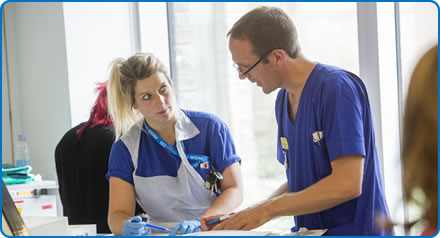Arrival & Assessment at AMU
On arrival to the Acute Medical Unit (AMU) nearly all patients will undergo a triage assessment in Gate 31b while some patients will go straight to Gate 31a (Ambulatory Emergency Care) which is a seated assessment area.
After triage by an Acute Medicine nurse you will have a primary assessment by a doctor. This assessment ensures that the sickest patients have investigations such as a chest x-ray and treatment can be started as soon as possible. Many of these very unwell patients will be moved to the Enhanced Care Area for closer monitoring and secondary assessment on Gate 31a. It is here that these patients will be reviewed by a medical Consultant.

It is here many patients will see a medical Consultant. The medical Consultant will decide if you need to stay in hospital or if you can be discharged out of hospital.
If you are discharged out of hospital further investigations may be needed and you may be referred to another Specialist or back to the care of your General Practitioner (GP).
If you need to stay in hospital you will either be admitted to a Specialist bed or moved to Gate 31a Short Stay. It is anticipated that most patients who require a short hospital stay of a few days will be discharged from Gate 31a.
Contact Acute Medical Unit
Acute Medical Unit (AMU)
Gate 31b and 31a
Level 0
Emergency Department
Brunel building
Southmead Hospital
BS10 5NB
Telephone: 0117 4144500
or: 0117 4144501
Fax: 0117 4149486
